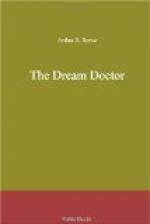“I haven’t looked into the case very deeply, but I’m not so sure that he had the secret, are you?”
Kennedy smiled. “That is what I’d like to know. I suppose that an expert like Mr. Borland could tell me, perhaps?”
“I should think so.”
“Where is his office?” asked Craig. “Could you point it out to me from the window?”
Kennedy was standing by one of the windows of the doctor’s office, and as he spoke he turned and drew a little field glass from his pocket. “Which end of the rubber works is it?”
Dr. Howe tried to direct him but Kennedy appeared unwarrantably obtuse, requiring the doctor to raise the window, and it was some moments before he got his glasses on the right spot.
Kennedy and I thanked the doctor for his courtesy and left the office.
We went at once to the office of Dr. Harris, to whom Winslow had also given us cards. We found him an anaemic man, half asleep. Kennedy tentatively suggested the murder of Cushing.
“Well, if you ask me my opinion,” snapped out the doctor, “although I wasn’t called into the case, from what I hear, I’d say that he was murdered.”
“Some seem to think it was suicide,” prompted Kennedy.
“People who have brilliant prospects and are engaged to pretty girls don’t usually die of their own accord,” rasped Harris.
“So you think he really did have the secret of artificial rubber?” asked Craig.
“Not artificial rubber. Synthetic rubber. It was the real thing, I believe.”
“Did Mr. Borland and his new chemist Lathrop believe it, too?”
“I can’t say. But I should surely advise you to see them.” The doctor’s face was twitching nervously.
“Where is Borland’s office?” repeated Kennedy, again taking from his pocket the field glass and adjusting it carefully by the window.
“Over there,” directed Harris, indicating the corner of the works to which we had already been directed.
Kennedy had stepped closer to the window before him and I stood beside him looking out also,
“The cut was a very peculiar one,” remarked Kennedy, still adjusting the glasses. “An artery and a vein had been placed together so that the endothelium, or inner lining of each, was in contact with the other, giving a continuous serous surface. Which window did you say was Borland’s? I wish you’d step to the other window and raise it, so that I can be sure. I don’t want to go wandering all over the works looking for him.”
“Yes,” the doctor said as he went, leaving him standing beside the window from which he had been directing us, “yes, you surely should see Mr. Borland. And don’t forget that young chemist of his, Lathrop, either, If I can be of any more help to you, come back again.”
It was a long walk through the village and factory yards to the office of Lewis Borland, but we were amply repaid by finding him in and ready to see us. Borland was a typical Yankee, tall, thin, evidently predisposed to indigestion, a man of tremendous mental and nervous energy and with a hidden wiry strength.




